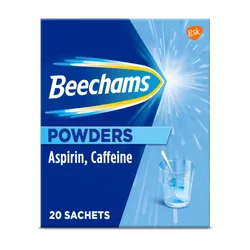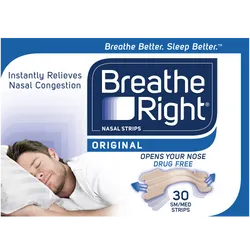Do not take Beechams All-in-one Tablets Non-drowsy Pack of 16 if:
- You are allergic to paracetamol, guaifenesin, phenylephrine hydrochloride or any of the other ingredients (listed in Section 6 of the PIL). Colour E 110 can cause allergic type reactions including asthma. Allergy is more common in those allergic to aspirin.
- You have kidney or liver problems (including alcoholic liver disease), overactive thyroid, diabetes, high blood pressure or heart disease.
- You have phaeochromocytoma or glaucoma.
- You are taking tricyclic antidepressants (e.g. imipramine or amitriptyline) or if you are taking or have taken in the last two weeks monoamine oxidase inhibitors (MAOIs) (e.g. moclobemide) prescribed for depression.
- You are taking beta blockers (e.g. atenolol).
- You have an enlarged prostate.
Contains paracetamol. Taking too much paracetamol can cause serious harm to your liver. Do not take anything else containing paracetamol while taking this medicine. Do not take with any other flu, cold, decongestant products or cough suppressants.
Take special care with Beechams All-in-one Tablets Non-drowsy Pack of 16:
- This product may cause dizziness. If affected do not drive or operate machinery.
- Ask your doctor before you take this medicine if you have a blood vessel disease such as Raynaud's Phenomenon, asthma or chronic cough, heart or circulation disease, or liver or kidney problems.
- Contact a doctor immediately if you get a combination of these symptoms.
- This medicine contains lactose (a sugar). Ask your doctor before taking this product if you have an intolerance to some sugars.
- During treatment with this medicine, tell your doctor straight away if: You have severe infection or severe illnesses, including severe renal impairment or sepsis (when bacteria and their toxins circulate in the blood leading to organ damage), or you suffer from malnutrition, chronic alcoholism or if you are also taking flucloxacillin (an antibiotic). A serious condition called metabolic acidosis (a blood and fluid abnormality) has been reported in patients in these situations when paracetamol is used at regular doses for a prolonged period or when paracetamol is taken together with flucloxacillin. Symptoms of metabolic acidosis may include: serious breathing difficulties with deep rapid breathing, drowsiness, feeling sick (nausea), being sick (vomiting) and loss of appetite.
If you are taking other medicines: Talk to your doctor or pharmacist before taking Beechams All in One Tablets if you are taking any prescribed medicines; particularly metoclopramide or domperidone (for nausea [feeling sick] or vomiting [being sick]) or ergotamine or methylsergide (for migraine) or colestyramine (to lower blood cholesterol) or drugs to lower blood pressure; appetite suppressants or stimulants; drugs to treat depression such as tricyclic antidepressants (e.g. amitriptyline) or heart disease (e.g. digoxin) or if you take blood thinning drugs (anticoagulants e.g. warfarin). Please inform your doctor or pharmacist if you are taking: flucloxacillin (an antibiotic), due to a serious risk of blood and fluid abnormality (called metabolic acidosis) that must have urgent treatment (see section 2 of the PIL).
Pregnancy and breast feeding: Talk to your doctor before taking this product if you are pregnant or breast feeding.
Possible side effects: Like all medicines, Beechams All in One Tablets can have side effects, but not everybody gets them. A small number of people have had side effects. Very rare cases of serious skin reactions have been reported. Stop taking this medicine and tell your doctor immediately if you experience: Allergic reactions which may be severe such as skin rash and itching sometimes with swelling of the mouth or face or shortness of breath. Skin rash or peeling, or mouth ulcers. Breathing problems. These are more likely if you have experienced them before when taking other painkillers such as ibuprofen or aspirin. Unexplained bruising or bleeding. Reoccurring fevers or infections. Nausea, sudden weight loss, loss of appetite and yellowing of the eyes and skin. Visual disturbances. This is rare but is more likely in those with glaucoma. Unusually fast pulse rate or a sensation of an unusually fast or irregular heartbeat. Difficulty passing water. This is more likely to occur in men with an enlarged prostate gland. The following side effects may also occur. Tell your doctor if you get them: Raised blood pressure, headache, dizziness, difficulty sleeping, nervousness, anxiety, diarrhoea, sickness or a serious condition that can make blood more acidic (called metabolic acidosis) in patients with severe illness using paracetamol (see section 2). If you get any side effects, talk to your doctor, pharmacist or nurse. This includes any possible side effects not listed in this leaflet. You can also report side effects directly via the Yellow card scheme at www.mhra.gov.uk/yellowcard or search for MHRA Yellow Card in the Google Play or Apple App store. By reporting side effects you can help provide more information on the safety of this medicine.

















